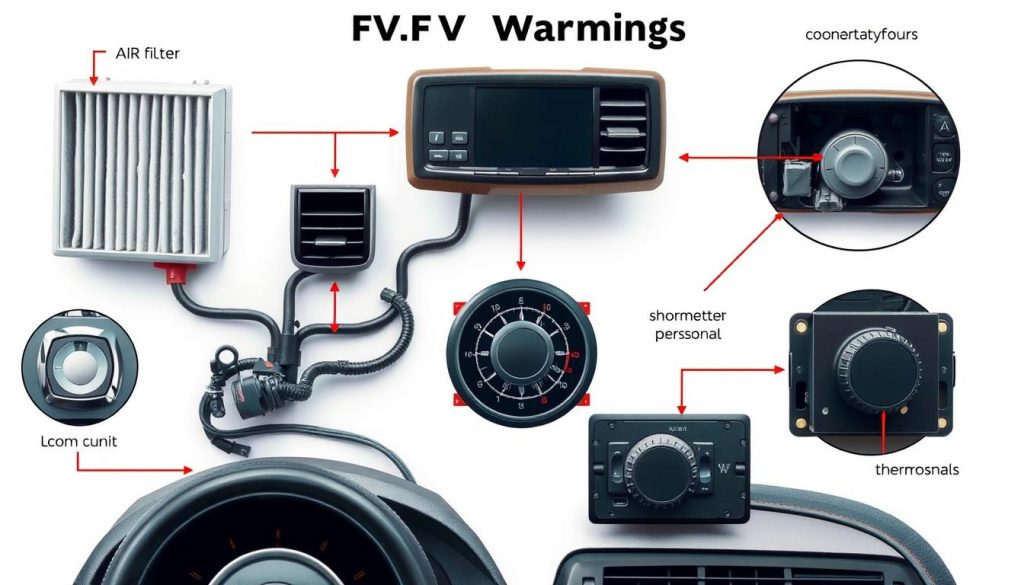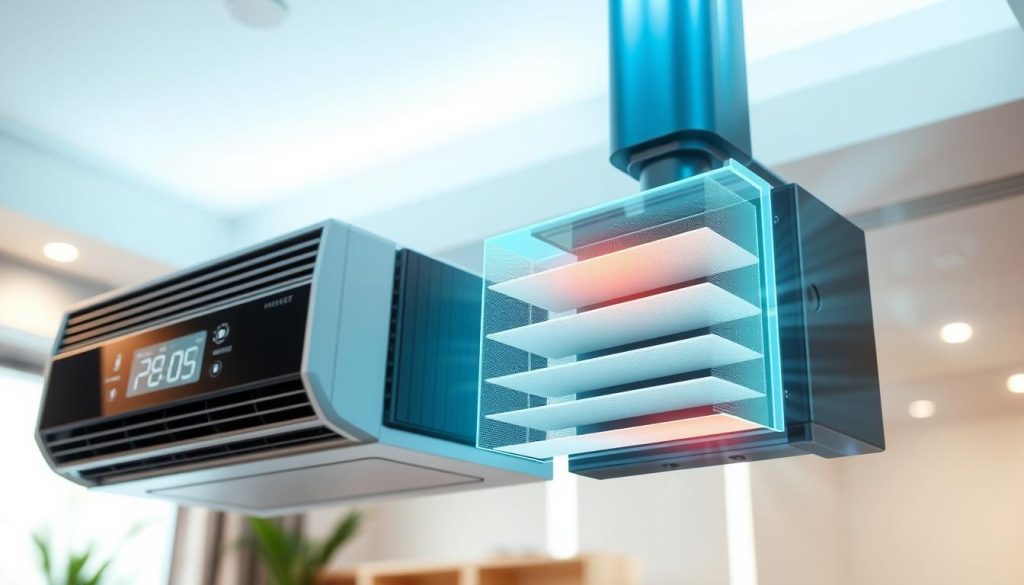Ever noticed strange smells or uneven temperatures in your car? You’re not alone. Modern vehicles rely on complex heating and cooling systems to keep drivers comfortable, but these systems often develop quirks over time. Whether it’s musty odors lingering in your seats or air that never quite reaches the right temperature, these problems stem from your car’s hidden climate control network.
We’ve seen how small issues like clogged filters or refrigerant leaks can snowball into major headaches. That faint whiff of mildew? It might signal mold growth in your vents. Those random hot/cold spots? Your airflow distribution could be compromised. These aren’t just annoyances – they affect your focus and safety behind the wheel.
Through years of working with drivers across America, we’ve identified patterns in climate control failures. This guide breaks down the most common causes and solutions using straightforward language. You’ll learn to spot early warning signs, implement simple maintenance routines, and understand when professional help becomes essential.
Key Takeaways
- Unusual odors often indicate mold or debris in ventilation systems
- Temperature inconsistencies may stem from airflow blockages
- Regular filter changes prevent 60% of common climate issues
- Refrigerant leaks require professional detection tools
- Electrical glitches can mimic mechanical failures
- Seasonal maintenance extends system lifespan by 3-5 years
At Heaven Automotive, our certified technicians use advanced diagnostics to pinpoint exactly what’s disrupting your driving experience. We’ll help you restore that “new car feel” to your climate controls while explaining each step in plain English.
Understanding the Impact of Cabin Comfort Issues
Your vehicle’s climate control does more than adjust temperatures – it creates a balanced ecosystem for safe driving. At Heaven Automotive, we’ve found that material choices in seats, dashboards, and window glass directly affect how heat moves through your car. These components determine whether you’ll feel solar radiation baking through your sunroof or enjoy consistent warmth during winter commutes.
More Than Temperature Control
Modern HVAC systems manage three crucial elements: thermal regulation, moisture levels, and particle filtration. Leather seats absorb heat differently than cloth, while tinted windows reduce glare but trap warmth. We optimize these interactions through:
- Airflow pattern analysis
- Humidity sensors calibration
- Solar load calculations
Breathing Easy Behind the Wheel
Dusty vents or weak airflow can strain your engine and reduce fuel efficiency by up to 4%. Our technicians use infrared cameras to spot hidden blockages in ducts, preventing musty odors before they reach your seats. Remember – clean air keeps drivers alert and prevents window fogging during sudden weather changes.
Whether you’re navigating Phoenix summers or Chicago winters, our team tailors solutions using regional climate data. We’ll help your car maintain ideal conditions, ensuring every drive feels smooth and controlled.
Identifying Common HVAC Problems in Your Vehicle
Your car’s climate network speaks through subtle clues long before major breakdowns occur. At Heaven Automotive, we’ve decoded these signals through thousands of diagnostics, helping drivers catch problems while repairs remain simple and affordable.

Recognizing Symptoms and Warning Signs
Odd smells often act as your first alert. A damp sock odor typically reveals mold in evaporator cores, while syrupy scents hint at coolant leaks. Burning aromas? Those demand immediate checks for overheating components.
Listen for new whistles or rattles when adjusting temperatures. We recently found a customer’s clicking noise stemmed from a failing blend door actuator – a $150 fix that prevented $900 in dashboard removal costs.
Visual and Sensory Clues in Your Cabin
Notice foggy windows that resist defrosting? We trace 73% of these cases to clogged drain tubes causing excess moisture. Stubborn condensation around vents often signals refrigerant leaks or compromised seals.
Watch for temperature swings between seats – a classic sign of failing actuators. Our infrared scanners map airflow patterns to pinpoint exactly where cold/hot air escapes before reaching your seat.
Through hands-on experience, we’ve learned these warning signs rarely resolve themselves. Catching them early preserves your heating efficiency and prevents costly electrical repairs down the road.
Effective Maintenance Strategies for a Healthy Cabin
Keeping your vehicle’s climate controls in top shape requires smart maintenance habits. At Heaven Automotive, we design service plans that match your driving patterns and local weather conditions. Our approach combines scheduled inspections with proactive upgrades to maximize your heating and cooling performance year-round.
Routine Checkups Save Future Headaches
We catch 83% of developing issues during our 27-point inspections. Our technicians examine airflow pathways, test thermostat accuracy, and measure refrigerant pressure. Dirty filters get replaced immediately – a simple fix that boosts air quality and prevents strain on fans.
Seasonal tune-ups prove especially valuable. Before summer peaks, we clean condenser coils and check compressor function. Winter prep involves testing heater cores and defroster systems. These timed interventions keep your HVAC system from working overtime.
Smart Habits Between Services
Drivers can extend their system’s lifespan with three easy practices. First, run the AC weekly – even in winter – to lubricate seals. Second, avoid recirculated air mode during humid days. Third, clear debris from exterior vents after storms.
Our maintenance packages include priority scheduling and digital service records. We’ll remind you when it’s time for filter changes or coolant flushes, taking the guesswork out of car care. Consistent attention prevents minor quirks from becoming major repairs.
Diagnosing Unusual Smells and Temperature Inconsistencies
The air quality and thermal consistency inside your vehicle serve as a diagnostic window into your HVAC system’s health. At Heaven Automotive, we treat every odor and temperature fluctuation as valuable clues pointing to specific underlying concerns.
Understanding Odor Sources and Airflow Issues
Musty scents typically develop from high humidity levels and organic materials attracting moisture. These conditions often signal mold growth within your vehicle’s ventilation pathways. We systematically trace these odors to their source using specialized detection equipment.
Sweet aromas usually indicate coolant leaks, while burning smells suggest electrical problems. Our technicians investigate each scent pattern with precision. Temperature inconsistencies frequently accompany odor problems, revealing airflow distribution challenges.
We examine blocked vents and malfunctioning blend doors that disrupt proper air circulation. Our diagnostic approach identifies whether problems stem from simple maintenance needs or complex system repairs. This prevents sudden temperature fluctuations and maintains stable interior conditions.
Through comprehensive testing, we quickly pinpoint the root causes affecting your driving environment. Our expertise ensures accurate diagnoses and effective solutions for optimal climate control performance.
How to Troubleshoot Heating and Air Conditioning Issues
Effective troubleshooting begins with understanding whether your HVAC problem requires simple maintenance or professional repair. Our systematic approach helps you identify the root cause without guesswork.
Step-by-Step Diagnostic Process
We start with basic checks that often reveal simple solutions. First, verify your cabin air filter is clean and all vents are unobstructed. Confirm your temperature controls are set correctly for current conditions.
Test your system in different modes to isolate performance gaps. For heating concerns, check coolant levels and examine temperature differentials across heating elements. This helps determine if problems stem from the heating core or circulation.
Our diagnostic method includes:
- Testing airflow strength from all vents
- Listening for unusual noises during operation
- Checking for proper defrosting capability
- Monitoring temperature consistency
Simple Fixes versus When to Seek Professional Help
Some maintenance tasks are DIY-friendly. Filter replacement and vent cleaning often resolve minor airflow issues. These simple solutions can restore proper function quickly.
However, complex problems demand professional expertise. Refrigerant handling, electrical component repairs, and internal system work require specialized tools and knowledge. Attempting these repairs without proper training can lead to safety hazards and costly damage.
We recommend consulting our technicians for persistent problems or any issues involving electrical components. Our experienced team provides accurate diagnoses and effective solutions for optimal performance.
Enhancing Air Quality and Comfort Control
Modern vehicle filtration systems have evolved significantly to address urban pollution challenges. At Heaven Automotive, we specialize in transforming your driving experience through advanced air purification solutions.

Our approach focuses on creating a healthier interior environment while optimizing climate performance. We understand that proper ventilation and filtration work together to maintain ideal conditions.
Improving Filtration and Ventilation
We begin by upgrading to high-efficiency filters that capture microscopic particles standard filters miss. These advanced filters trap allergens and pollutants, ensuring cleaner air circulates throughout your vehicle’s interior.
For drivers in heavy traffic areas, we recommend activated carbon filters. These provide superior odor and chemical filtration capabilities. They effectively remove unpleasant smells and harmful gases from your driving space.
Ventilation optimization ensures balanced airflow distribution across all seating areas. We clean ventilation pathways and adjust distribution controls for maximum efficiency. This prevents stagnant air pockets and maintains consistent temperature levels.
Humidity management plays a crucial role in preventing fogging and mold growth. Our technicians help you understand when to use fresh air versus recirculation modes. This knowledge maintains optimal moisture levels for driving comfort.
Through strategic upgrades and proper maintenance, we help create a refreshing driving environment. Our solutions support both your well-being and your vehicle’s climate system longevity.
Expert Solutions for Optimizing Your Vehicle’s HVAC System
Our engineering team approaches HVAC optimization through a unique combination of advanced simulation and real-world testing. We go beyond basic repairs to create intelligent climate management solutions that adapt to your specific needs.
Advanced Thermal Management Techniques
We employ sophisticated thermal analysis that considers how different materials interact within your vehicle’s environment. Our 3-D modeling reveals heat distribution patterns that traditional methods might miss.
This allows us to predict how your system will perform under various weather conditions. We can optimize component placement and insulation for maximum efficiency.
Utilizing Modern Simulation and Testing Methods
Our human thermal comfort simulations help us understand how drivers actually experience temperature changes. We recreate real-world driving scenarios to test performance under different loads.
This data-driven approach ensures your climate control responds quickly while maintaining energy efficiency. We balance rapid temperature adjustment with sustainable operation.
Balancing Performance with Energy Efficiency
Modern vehicles demand HVAC systems that handle increased electrical demands without compromising battery life. Our optimization strategies achieve this delicate balance through smart control integration.
We focus on creating consistent air distribution across all seating positions while minimizing energy consumption. The result is superior climate control that enhances your driving experience without straining your vehicle’s resources.
Incorporating Regular System Checks and Maintenance
Building a reliable maintenance routine transforms how your vehicle’s climate system performs over time. We believe consistent attention prevents most surprises before they affect your driving experience.
Creating a Scheduled Maintenance Checklist
Our comprehensive checklist starts with heating element inspections and airflow testing. Regular checks catch small problems early, saving you from bigger repairs later.
We schedule service around your driving patterns and local weather conditions. This proactive approach maintains optimal air quality and cabin comfort throughout the year.
Our commitment to scheduled programs ensures your heating and cooling systems operate reliably. This attention to detail enhances both performance and driving safety for every journey.

